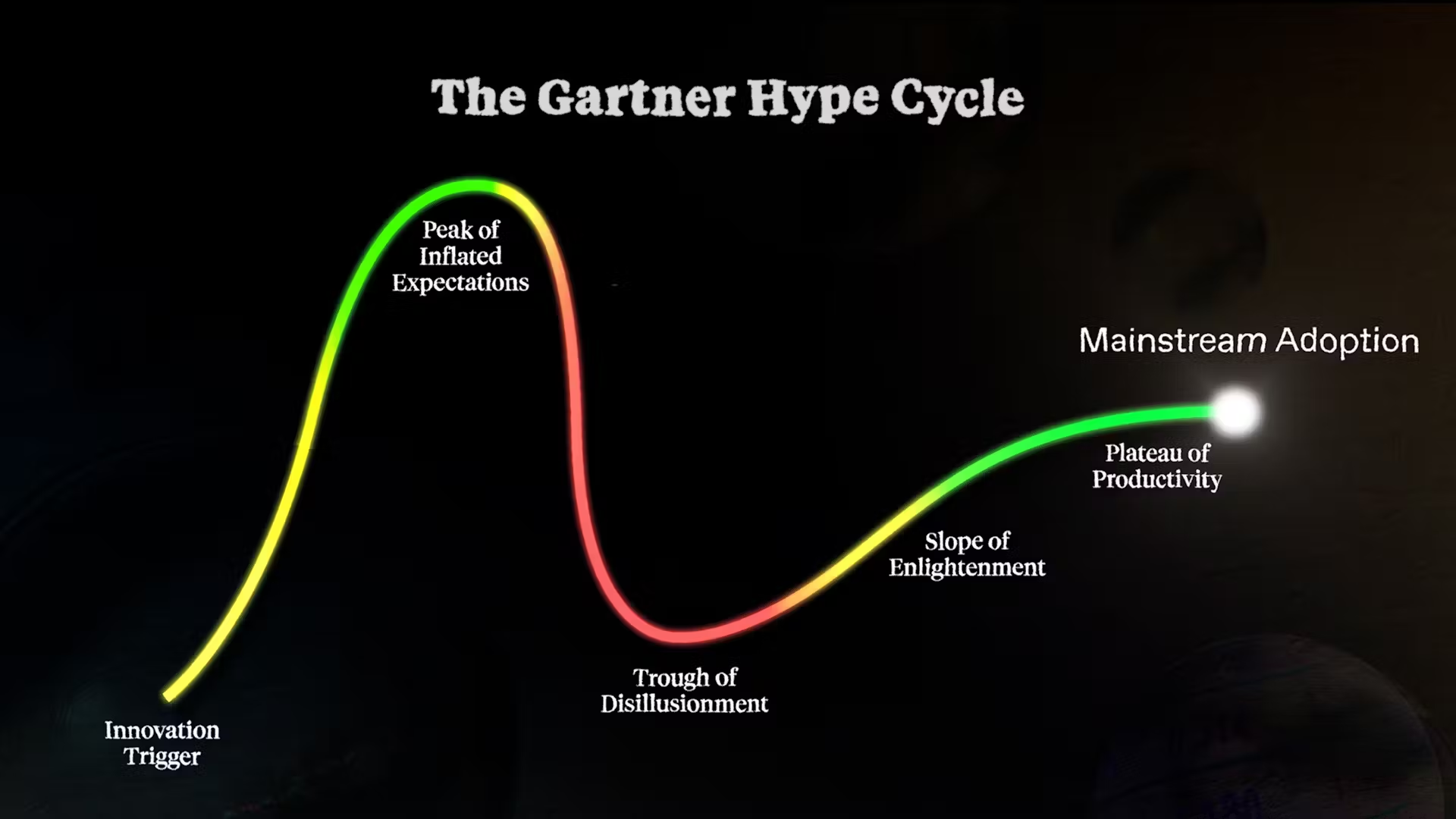Everyone needs to stop and take a breath. AI replacing jobs is a real conversation, but not in the areas that you might think.
The panic is palpable. Headlines scream about the job apocalypse, and executives race to cut entry-level positions before AI supposedly makes them obsolete. The World Economic Forum’s Future of Jobs Report 2025 reveals that 40% of employers expect to reduce their workforce where AI can automate tasks, while recent data shows entry-level roles have seen an average decrease in hiring rates of 73.4% compared to just a 7.4% decrease across all job levels.

But here’s what the doomsayers aren’t telling you about AI replacing jobs: they’ve probably never actually sat down to do mundane work with AI.
The Power User’s Perspective
I’m not an AI researcher or a board member rubbing elbows with tech titans. I’m a marketing professional who uses at least four different large language models for six hours daily. I’ve built custom GPTs, created automations, and after 35 years in marketing, I’ve deliberately returned to the most basic, entry-level work imaginable—merging spreadsheets, cleaning data, finding email addresses—specifically to test AI’s transformative potential.
The results? Less than “meh.”
Why AI Replacing Jobs Isn’t What You Think: The Data Quality Problem
If AI should excel anywhere, it’s in data management—the quintessential entry-level task. Yet AI’s performance on these fundamental jobs reveals a troubling truth about the technology’s current limitations.
If the data AI works with is incomplete or inaccurate, it can lead to significant problems, While AI models excel at tasks like International Mathematical Olympiad problems, they still struggle with complex reasoning benchmarks and often fail to reliably solve logic tasks even when provably correct solutions exist.
In practice, this means AI makes the same mistakes repeatedly. It takes hours to test different tools, and errors compound. When I manually counted 55 bounced emails, contacts I’d entered myself, sent messages to, and knew intimately, the AI reported only 10. That’s not a rounding error; that’s a fundamental failure in accuracy.

The insidious part? With unfamiliar data, you’d never catch these errors. Data cleaning becomes a whack-a-mole game: fix one issue, create another. The volume of data points makes comprehensive spot-checking impossible, leaving you unable to distinguish good data from bad.
Why Data Quality Matters More Than Ever
“Garbage in, garbage out” has become a dismissive cliché, but this mundane information is your raw ingredient. Ask any Michelin-starred chef what makes their food exceptional, and they’ll cite ingredient quality. Your spreadsheet data is no different—if it’s compromised, everything built upon it collapses.
Low-quality data leads to higher error rates, poor pattern recognition and inconsistent decision-making. This isn’t just an inconvenience; it’s a fundamental threat to business intelligence, customer relationships, and strategic decisions.
To trust AI output requires either hours of spot-checking—during which you’ll still find mistakes—or intimate familiarity with the data. The catch-22 is obvious: if you’re familiar enough with data to verify AI’s work, you’ve already done much of the work yourself.
The Wrong End of the Workforce Spectrum
Here’s the uncomfortable truth: we’re deploying AI at precisely the wrong level of our organizations. Using AI to replace entry level jobs is denying the organization for a critical apprenticeship process that provides new employees with key knowledge and wisdom about your business.
And yet data from the biggest public tech firms and maturing venture-capital funded startups shows a 50% decline between 2019 and 2024 in new role starts by people with less than one year of post-graduate work experience.
We’re eliminating the very people responsible for data accuracy and information integrity—the foundation upon which every strategic decision rests. Meanwhile, the executives making these elimination decisions often haven’t personally performed the work they’re automating away in years, if ever.
The ego problem at the top is real. If AI truly excels at big-picture strategy and pattern recognition, perhaps we should be questioning whether C-suite decisions, not entry-level data work are where automation makes sense.
The AI Bubble Nobody Wants to Admit

AI adoption has exploded—usage has nearly doubled since 2023, according to Gallup. Yet a recent MIT study found that 95% of organizations see no measurable return from their AI initiatives.
That’s not transformation. That’s a bubble.
McKinsey reports that nearly eight in ten companies now claim to use AI in at least one business function. But most can’t point to a single KPI that’s meaningfully improved. The hype is real—but the impact isn’t.
And this is where the term “workslop” comes in. It describes the flood of low-value, AI-generated output that feels productive but delivers no actual progress. It’s corporate busywork on steroids—outputs that look good in dashboards but don’t change outcomes.
So, while companies cut real jobs to fund AI experiments, they’re unintentionally replacing meaningful work with meaningless noise. AI isn’t replacing workers—it’s replacing quality with quantity.
What AI Actually Does Well
This isn’t an anti-AI screed. AI has genuinely transformed how many of us work. Starting salaries for entry-level AI workers rose by 12% from 2024 to 2025, and young workers who learn to use AI effectively can be much more productive.
The technology excels at first drafts, brainstorming variations, summarizing lengthy documents, and handling specific, well-defined tasks. This article itself is a hybrid: my thoughts and research, enhanced by AI that transforms raw ideas into more readable prose.
But there’s a massive difference between AI as an assistive tool and AI as a replacement. The former augments human judgment, creativity, and quality control. The latter assumes AI has achieved a reliability it simply hasn’t demonstrated.
The Real Future of Work
While AI might not be eliminating a large percentage of early career jobs, it certainly is changing them in a big way. The question isn’t whether AI will transform work—it already has—but whether we’re smart enough to deploy it strategically rather than reactively.
Smart organizations will:
- Maintain front-line employees who ensure data accuracy and integrity
- Use AI to augment rather than replace human judgment
- Recognize that institutional knowledge—understanding your data deeply enough to spot AI errors—is irreplaceable
- Invest in training workers to use AI effectively rather than replacing them with unreliable automation
The data scientists and entry-level workers aren’t the problem. The problem is leadership that views technology as a cost-cutting measure rather than a tool for enhancing human capabilities.
The Bottom Line
Before we panic about AI replacing jobs, perhaps we should ask whether it can reliably count email bounces. Before we eliminate entry-level positions en masse, perhaps executives should spend a week doing the work they’re automating away.
AI is powerful, transformative, and here to stay. But it’s not magic, it’s not infallible, and it’s certainly not ready to replace the humans who ensure our foundational data is accurate.
The real revolution won’t come from replacing workers with AI. It will come from finally recognizing that the “mundane” work AI struggles with is actually the sophisticated, judgment-intensive foundation that everything else depends upon.
Stop freaking out about AI taking over. Start worrying about losing the institutional knowledge and quality control that keeps organizations functional. Because right now, we’re in danger of automating away our ability to know whether our AI is right or wrong—and that’s far more dangerous than any job displacement.

![12 ebook templates for InDesign, PowerPoint, and Google Docs [free download] 12 ebook templates for InDesign, PowerPoint, and Google Docs [free download]](https://knowledge.hubspot.com/hubfs/free-ebook-templates-1-20240529-4957105.webp)






